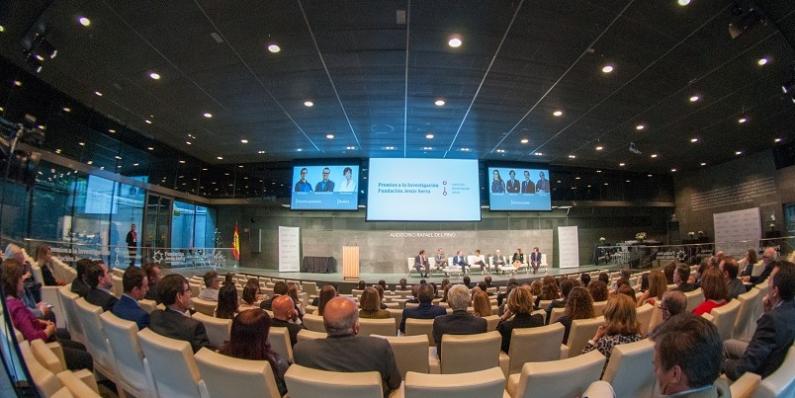3ª edición de los Premios a la Investigación Fundación Jesús Serra en los ámbitos de la nutrición y la alimentación
6/10/21 | Fundación Occident
"Researchers Borja Ibáñez Cabeza, Maria Carmen Collado and Rubén Nogueiras win the 3rd edition of the Jesús Serra Foundation Research Awards for their research in the fields of nutrition and food. "
Dr. Borja Ibáñez Cabeza, director of the Clinical Research Department of the National Centre for Cardiovascular Research (CNIC), researcher Maria Carmen Collado, from the Biotechnology Department of the Institute of Agrochemistry and Food Technology-Spanish National Research Council (IATA-CSIC), and professor and researcher Rubén Nogueiras, from the Singular Centre for Research in Molecular Medicine and Chronic Diseases, have been named by the jury of the Jesús Serra Foundation Research Awards as winners of the 3rd edition of the awards in the clinical research categories, with Borja Ibáñez and Maria Carmen Collado as joint winners, and Rubén Nogueiras in the basic category. This award is aimed at scientists up to 45 years of age specialising in nutrition and food.
Dr. Borja Ibáñez Cabeza, joint winner of the 3rd edition in the clinical category, heads the Clinical Research department of the National Centre for Cardiovascular Research (CNIC), and he is a cardiologist in the Hospital Universitario Fundación Jiménez Díaz, as well as Group chief in the CIBERCV. He has received this award for his clinical research career and, specifically, for his research work "Nutritional approaches for the prevention of cardiotoxicity associated with cancer treatments", focused on developing a new therapeutic intervention aimed at reducing the prevalence of chronic heart failure in cancer survivors. Every year, 4 million new cancers are diagnosed in Europe, of which more than 60% will receive a combination of drugs including anthracyclines. One of the most feared side effects of this group of drugs is direct toxicity to the heart, which can occur in up to one third of patients receiving high-dose anthracyclines. This toxicity can result in severe heart failure in more than 5% of cases. Ongoing studies by Dr Ibáñez's research group show that nutritional approaches based mainly on intermittent fasting and dietary restriction are associated with an increase in asymmetric fission processes and mitophagy, and therefore may protect against anthracycline cardiotoxicity.
According to the director general of the CNIC, Valentín Fuster, "there are very few researchers in the world capable of understanding translational research as Borja Ibáñez does, capable of deciphering disease and treatment mechanisms at the molecular level and then taking them to the clinic and testing these therapies in clinical trials". For Dr. Ibáñez, receiving this award "is an important recognition of a study that we consider to be a pioneer in Europe and that will attract a lot of interest both in the cardiovascular and oncology fields, as well as among the general public. It will also allow us to provide more resources for the project so we can meet our objectives.
For her part, researcher Maria Carmen Collado, joint prize winner in the clinical category from the Biotechnology Department of the Institute of Agrochemistry and Food Technology-Spanish National Research Council (IATA-CSIC), has been selected for her research career in the field of clinical research and, in particular, for her research work "Interaction between microbiota and diet during the first 1,000 days of life". This project aims to highlight the importance of nutrition, the microbiota and the environment during the first 1,000 days from conception to the second year of life because of their crucial importance in influencing both the growth and development of the child's body and in the prevention of future non-communicable diseases such as obesity, allergies and diabetes in adults.
Dr. José F. Marcos, director of the Institute of Agrochemistry and Food Technology (IATA), stated that "Dr. Maria Carmen Collado has had a great research career. We were delighted that she came to collaborate at the IATA-CSIC, where she provided new techniques and research possibilities". He also highlighted her excellent scientific record "which is evidenced in the indicators she has obtained: an h-index of 49 in Publons and of 51 in Scopus". Maria Carmen Collado stated that this recognition constitutes "support for the development and application of new maternal and infant intervention strategies using diet, probiotics and/or functional foods to reduce the risk of certain diseases through early prevention of alterations in the microbiota. This award will also allow us to complete the work we have underway and to maintain our position as a research group in the maternal and child area both in Spain and abroad".
Dr. Rubén Nogueiras, winner in the basic category, is a researcher at the Singular Centre for Research in Molecular Medicine and Chronic Diseases and full professor at the University of Santiago de Compostela (CIMUS-USC). He was selected to receive this recognition for his project "Role of Tanycytes in Nutrient Sensing", which is closely focused on pandemic diseases that involve a high economic, social and health cost such as obesity. This research aims to provide insight into the mechanisms involved in the interaction between the central nervous system and peripheral organs to regulate energy balance, and to investigate new mechanisms involved in the development of non-alcoholic fatty liver disease, a disease closely linked to obesity, whose prevalence is steadily increasing, and for which there is no treatment.
Professor Carlos Diéguez, Scientific Director of CiMUS, USC and Scientific Director of CIBER OBN, states that "Rubén Nogueiras is a young researcher. He is internationally recognised in the field of central control of metabolism and, more recently, for his studies on the metabolic role of p53. He will undoubtedly play an important role in the future of research in Spain". For Rubén Nogueiras, winning this award "is an important recognition of our work and a support for research that can provide a completely new perspective on how communication between peripheral organs and the central nervous system takes place".
The jury for the 3rd edition of the Research Prizes of the Jesús Serra Foundation, chaired by Dr María Blasco, director of the National Centre for Cancer Research (CNIO), was composed of Dr Mercedes Rincón, professor in the Medicine Department at the Immunology Division of the University of Vermont; Professor Lina Badimon, director of the Catalan Institute of Cardiovascular Sciences (ICCC) and professor of research at the Spanish National Research Council (CSIC); Dr Carlos Macaya, director of the Cardiology Unit at Madrid's San Carlos Clinical Hospital and chairman of the Spanish Heart Foundation (FEC); Dr Pedro Mata, chairman and founder of the Spanish Familial
Hypercholesterolaemia Foundation; and the two winners of the first edition of the Jesús Sierra Foundation research prizes: Raúl Zamora Ros, researcher at the Bellvitge Biomedical Institute (IDIBELL) and the Catalan Institute of Oncology; and Salvador Aznar Benitah, researcher at the Catalan Institution for Research and Advanced Studies (ICREA) and the Barcelona Institute for Research in Biomedicine (IRB Barcelona). The jury weighed the three candidates' research careers and the important contribution of their work to both clinical and basic research.
The award ceremony will take place at 7.30pm next Wednesday, 16 June, at El Beatriz Madrid, and will be streamed on the Jesús Serra Foundation's Youtube channel. The event will be attended by Ms. Ana Isabel Cremades, Director General of Research and Technological Innovation of the Regional Ministry of Science, Universities and Innovation of the Community. The event will be hosted by Sonsoles Ónega.
According to Federico Halpern, president of the Jesús Serra Foundation: "For the Foundation it has always been very important to support research in Spain and research focused on nutrition and food even more so. This past year has only reinforced our thinking and that is why we continue to support young scientists to help improve the eating habits of our society. This 3rd edition examined many good projects and proof of this is the career trajectory and importance of the scientists who have won.
The goal of the Jesús Serra Foundation Research Prizes, which are worth €35,000 in each category, is to encourage research in a field that has been shown to be of fundamental importance: the relationship between nutrition, diet and health. This link has been consolidated such that many studies and research works indicate that lifestyles and eating habits are capable of preventing and improving the clinical situation of diseases such as coronary heart disease, high cholesterol, diabetes, cancer and obesity, among others.
For the latest news, you can follow the Jesús Serra Foundation Research Prizes on social media using the hashtag: #PremiosInvestigaciónFJS.
Contact for press and media

Jone Paredes
comunicacion@gco.com

